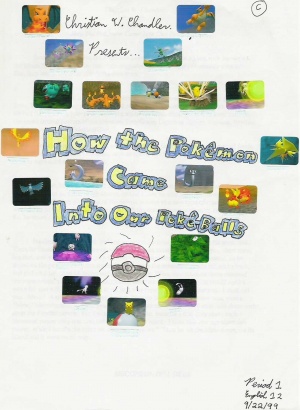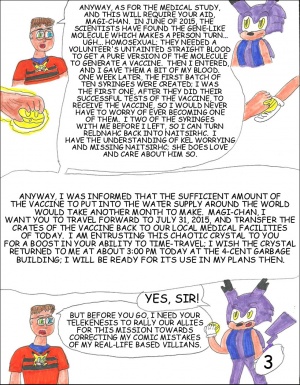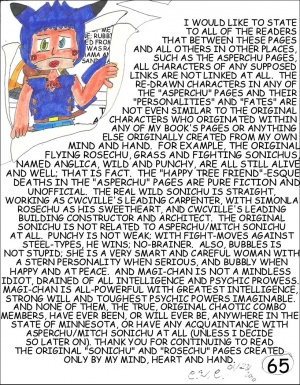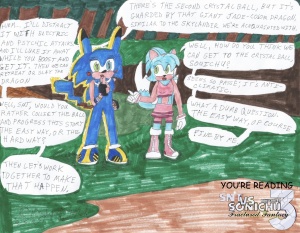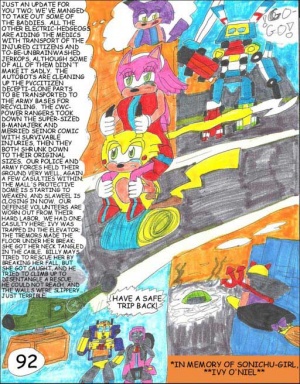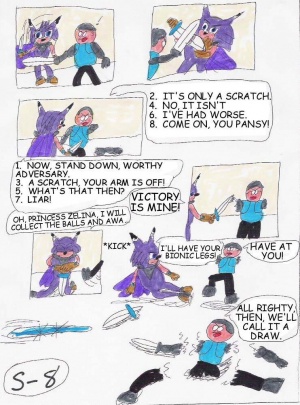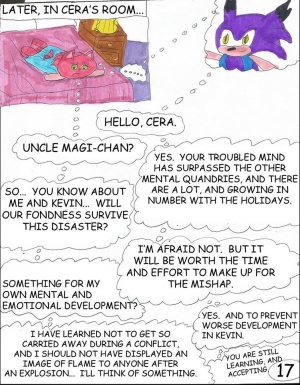Difference between revisions of "Chris and writing"
Blue Bully (talk | contribs) |
|||
| Line 93: | Line 93: | ||
In poem and lyric, Chris has a poor understanding of the anatomy of an appealing composition. He mistakes exceedingly saccharine language for the romantic. He also pads out gaps with [[random-access humor]] and [[I Love Lucy|curiously dated language]]. | In poem and lyric, Chris has a poor understanding of the anatomy of an appealing composition. He mistakes exceedingly saccharine language for the romantic. He also pads out gaps with [[random-access humor]] and [[I Love Lucy|curiously dated language]]. | ||
He has total disregard for proper meter, and rhymes are forced with bizarre neologisms (''Rosey, as often as birds tweet/will you be my lovely heartsweet?''<ref>[[Sonichu's Ode to Rosechu]]</ref>). Sometimes he can't even manage to make it rhyme (''Heart-broken, sad and very lonely,/I may never remove my virginity''<ref>[[Saddest Heart in the World]]</ref>). | He has total disregard for proper meter, and rhymes are forced with bizarre neologisms (''Rosey, as often as birds tweet/will you be my lovely heartsweet?''<ref>[[Sonichu's Ode to Rosechu]]</ref>). Sometimes he can't even manage to make it rhyme (''Heart-broken, sad and very lonely,/I may never remove my virginity''<ref>[[Saddest Heart in the World]]</ref>). The result is poetry that occupies the uncanny valley between metric and free-verse form. | ||
Not even the Bard of Avon is safe from Chris. In [[Sub-Episode 3]], a famous line from ''{{w|Macbeth}}'' has a stupid couplet of Chris's making tacked on to its end (I shatter hearts as I please! I hurt them hard with the greatest of ease!<ref>[http://archive.sonichu.com/cwcipedia/index.php?title=Issue_4/Page_20 Issue 4 Page 20]</ref>), while [[Bubbles]] mutilates a line from the ''{{w|The Tempest}}'' in ''[[Sonichu 8]]''.<ref>[http://archive.sonichu.com/cwcipedia/index.php?title=Issue_8/Page_95 Issue 8 Page 95] (paraphrasing Miranda's famous line, "O brave new world, That has such people in't!")</ref> Needless to say, the contrast is not that hard to see. | Not even the Bard of Avon is safe from Chris. In [[Sub-Episode 3]], a famous line from ''{{w|Macbeth}}'' has a stupid couplet of Chris's making tacked on to its end (I shatter hearts as I please! I hurt them hard with the greatest of ease!<ref>[http://archive.sonichu.com/cwcipedia/index.php?title=Issue_4/Page_20 Issue 4 Page 20]</ref>), while [[Bubbles]] mutilates a line from the ''{{w|The Tempest}}'' in ''[[Sonichu 8]]''.<ref>[http://archive.sonichu.com/cwcipedia/index.php?title=Issue_8/Page_95 Issue 8 Page 95] (paraphrasing Miranda's famous line, "O brave new world, That has such people in't!")</ref> Needless to say, the contrast is not that hard to see. | ||
Revision as of 21:24, 25 June 2022
- This article discusses Chris's writing from a literary perspective. For Chris's general abilities with written English, such as with spelling and grammar, see Chris and English#Written language.
| “ | I do believe it wouldn’t be published, not because of the art style, but because of the story. I mean, no one wants to read this. | ” |
| Comic artist Mara Wild, on Sonichu.[1] | ||
Chris's writing is marked by many flaws that have persisted throughout his creative output.
General problems
- See also: Chris and art, Sonichu (comic)
At the heart of it, Chris's writing is rather two-faced. Despite the subject matter frequently being completely unsuitable for children, Chris shows a juvenile, simple writing style. But at times, he throws in (and misuses) college-level vocabulary words and attempts to use advanced sentence structure; he is quite fond of semicolons, even if he uses them to link together two unrelated sentences. The result is a confusing, jumbled writing style.
Chris frequently pauses from the action to describe exactly what a character is wearing and expound upon trivial aspects of characters in unnecessary detail, even when it has no relevance to the plot. Inversely, he frequently glosses over important things that may have relevance at some point. Even in "action" scenes, Chris will frequently pause in order to introduce something completely irrelevant.[2] The overall presentation is consistently sloppy, marked by unwieldy turns of phrase and elementary typographical errors that suggest that Chris does not proofread anything he creates before putting it on the Internet. Also, Chris has the habit of using the font Comic Sans to type, which is generally considered lazy, cliched and ugly. Luckily, in Sonichu 12-9, he moved on to Proxima Nova.
Chris produces no preparatory writing of any sort for his stories, content to make them up as he goes along and putting the overall narrative at the mercy of his moods and fancies. He regularly changes his mind as to what the story should be and contradicts what has come before as he pleases, unable to comprehend why this would bother his audience. He also often introduces and foreshadows seemingly important plot elements that never substantially contribute to the plot or are dropped abruptly when Chris loses interest in them.
To the surprise of nobody, Chris is no Alan Moore and Sonichu is no Watchmen. Chris makes no effort to work to the strengths of the comic medium, and instead approaches his comics more like a television series or anime in structure, using storytelling techniques and visual information that work in those mediums but not so well on paper. He is ignorant towards comic books and how they are supposed to work as a sequential narrative. Despite a desire to work for major companies like DC, Marvel, Dark Horse and Archie, Chris has never shown any real interest towards those companies and their publications, though he did seem vaguely aware of the miniseries Marvel Zombies in one of the Alec calls, criticizing its violent and parodic nature despite admitting to having never read it. Within Sonichu itself, his Mary Sue insert has referred to the comic as an anime and himself as its director, and has given it ratings such as TV-14, etc., which only apply to television standards. Sonichu isn't so much a work designed to be a comic, but rather an economic storyboard and/or script for a hypothetical TV show or video game.
Exposition
| “ | Fifteen minutes of dialogue, and a transformation, later... | ” |
| Chris, not even trying anymore | ||
A common thread in discussions of Creative Writing is the doctrine of "show, don't tell" when writing fiction; rather than having events merely be told to the reader through characters, if possible, the author should feature the scene as it happened, with the characters being a part of it. This point was clearly lost on Chris.
As a writer, Chris is over-reliant upon exposition, to the point that some works (such as The High School Story) contain nothing else. Chris does not like to illustrate facts of his stories through example, and instead expects the reader to accept his every word as gospel, leaving no room for interpretations that are not TRUE and HONEST. Confusing dialogue for exposition, Chris believes that his level of exposition is normal in mainstream comics.[3]
When Chris ripped off the comic Rosechu's Story for use in Sonichu 15, he added in heavy exposition. When criticized by fans, Chris commented:
| [Rosechu's Story] definitely compares and contrasts to my own that goes beyond literal small talk. In my defense on the heavy dialogue: I have lots of wisdom and thoughts to share, so I digress.
It beats saying one line, leaving it at that, and Not getting the explanation and thought across. Big difference between #TeenTitans and #TeenTitansGO: GO has decreased explanatory dialogue, and look at how crappy it is. The original show offers the greater detail in good ways.[4] |
In addition, Chris critically fails at the literary element "show don't tell" even in illustrated action scenes, choosing instead to describe what a character is doing between two asterisks (some notable offenders are *CUTS VINES*, *CRASH TO GRASS*,[5] *TELEPORTS IN*, and *MAKES GUN DO A 180*.), which shows that the idea of onomatopoeia is lost to him. In these cases, examples including "SLICE", "THUMP", "WHOOSH" and, perhaps, "SQUEAK" would have told readers the same thing, but with a lot more emphasis on what's going on.
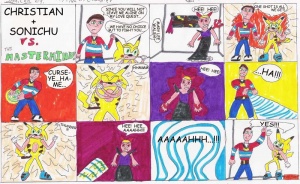
Characterization
- See also: Character design
Chris's characters, as they are written, are distinguishable only by the vaguest surface elements. Chris's view of ideal personalities in men and women is clear to him, and because he wants all of his creations to be perfect, his characters are barely-distinct variations on a theme. Chris does not comprehend the appeal of characters with flaws. In his second call with Alec Benson Leary Chris explained that because he considers all of his characters to be very much real, living things that exist in some sort of cartoon universe, giving them flaws would amount to tormenting a living creature (in the context of the conversation, Chris defended bleaching Asperchu into "Mitch Sonichu" because the character shouldn't have to suffer his original name). His general response to the criticism that his characters lack personality is denial.
The indistinct characterizations of the Sonichu cast are reflected in their dialogue. Chris does not use dialogue to suggest distinct personalities and worldviews. All characters are equally capable of speaking as Chris does, and from Chris's perspective, including small children.
This in turn leads to only three basic stock personalities. All males (except for Chris) are superficial idiots who are only interested in fucking and enforcing Comic-Chris's draconian laws, all of the females are vacuous sluts who only want to fuck, shop and cook (in that order, no less), and Comic-Chris comes off as a murderous, insane dictator of a militaristic city-state enforced by a paramilitary secret police and a pack of super-powered goons with immunity from prosecution and freedom to commit any atrocities they (and he) please, utilizing a psychic hedgehog to spy on his citizens to make sure there are no gay people, and gleefully reveling in the pain he inflicts on those whom he deems unworthy.
Just as the protagonists are designed to be Chris's bland, homogenous vision of ideal heroism, the antagonists are simply evil for the sake of evil. The villains more often than not act with no apparent motivation whatsoever other than an abstractly contrived desire to bully Chris by sabotaging his heroic efforts to get a girlfriend. How they would prosper from this is unknown, especially considering that they have not once ever come close to defeating the Hedgehogs. Since Chris doesn't see the appeal in protagonists with flaws, he likewise doesn't see the appeal in villains with redeeming qualities (probably because most of his enemies are avatars of real people whom Chris genuinely believes are involved in a conspiracy against him). The closest thing to a sympathetic villain is Blake, but only because he has a raging heterosexual libido just like all the other furries in the comic.
Consequentially, any attempt at character development fails miserably. Chris marks any change in character by indicating (in exposition, of course) something akin to "it just happened." With Blake, who arguably goes through the most stark change in character (an antagonist becoming a supporting character), there is absolutely no moral struggle or any build-up to the moment he defects to the side of good. His sudden infatuation with Bubbles (who beat him almost to death a few issues prior) and a brief, nonchalant mention of mistreatment at the hands of his master are all the reasons the reader is given for why Blake changed sides. Blake isn't even the worst offender, either; no reason is given for Wes Iseli's defection to the enemy at all. Despite last being seen as a rival to Chris, yet still ostensibly on his side, Wes is suddenly placed with the antagonists, long after seemingly becoming irrelevant in Chris's reality.
Dialogue
Chris only uses dialogue as an expository device in his comics in the bluntest fashion possible. Chris feels the need to include extensive amounts of dialogue in his comic, resulting in textwalls that demand type so small that they often threaten to become illegible. Textwalling is Chris's preferred method of dictating the story as he means for it to be experienced by his reader. Chris has defended this practice due to feeling a "preference to elaborate, because some people rarely get visual references."[6] On a similar note, speech often includes hand-drawn emoticons to display what the speaker is feeling, affirming the notion that Chris doesn't believe that his artwork or dialogue alone can convey his ideas, in addition to his total ineptitude with emotions.
Even when not textwalling, Chris's dialogue is highly unnatural. He appears to have no grasp of voice, with nearly all his characters using the same stilted tone, verbosity, and CWC-isms. This can easily be seen in early issues, where the phrase "boyfriend-free girl" pops up from multiple characters. This may be a symptom of his lacking theory of mind: he believes that, since he talks in this fashion, so does everybody else. The heavy-handedness, stiltedness, and single-mindedness of his dialogue can be seen as symptomatic of Chris's autism.
Plot and Drama
Chris's confused understanding of reality and fantasy affects his ability to write captivating fiction. Because Chris considers his creations to be "alive" in some parallel universe, he finds that giving them artificially happy and uncomplicated lives is satisfying, and assumes that his TRUE and LOYAL fanbase shares this interest.
Chris seeks to avoid tension or suspense that would trouble his creations and his intended audience wherever possible. Thus, he is unwilling to depict his characters in peril that is convincing, and therefore, "real," and wants to pair them off early and dwell on their long, idyllic romances. Villains tend to put up laughably little challenge, and the protagonists usually win with a show of devastating and effortless force. Virtually every fight ends with the heroes winning almost immediately and with little difficulty. Initially villains are allowed to posture about a little before Sonichu shows up to ruin their shit, but as the comic goes on and Chris comes into conflict with internet trolls, the battles become even shorter and less climactic for the sake of emphasis. Likewise, any instances emotional drama between characters are resolved immediately.
An early exception to the above can be found in Sub-Episodes #7 and #8 in Sonichu 4, in which Chris gets utterly curbstomped by Bagget and the Jerkops under his administration. Even then, Chris's defeat only really happened because no one was there to save him, and was more or less made irrelevant with the arrival of Crystal. The only time where a problem was resolved without an artificially cheery resolution was in Sonichu 11, wherein Cera Rosechu fails to mend her relationship with Kevin the Jew, though the character seems "over it" after crying a little about it.
Similarly, previews and allusions to the future always emphasize victory over the forces of evil. A vision of the PVCC attacking CWCville ends rather conclusively with Chris saying "Good, we've won!" A terse preview for the following issue completely dismantles all the tension in the only marginally dramatic plot arc: "Next issue I get out of the time void." His devotion to neutralising tension is such that in Sonichu 10, Magi-Chan broke the fourth wall to prematurely reveal that he would eventually fall in love with Silvana, presumably so that readers would not have to worry about what would happen to them in the meantime. Even the worst writers would never use the words "spoiler alert" in one's own work (with experienced ones instead opting for foreshadowing), but Chris feels it necessary to spoil a yet-to-be-revealed plot point in the comic.
As you might guess, on top of everything else, this makes the storyline for Sonichu unendurably boring.
Ironically, the sole exception to this rule is Chris himself - but even this treatment is baffling. As the activities of Comic-Chris are based on his Creator, he is unable to simply resolve Chris's Love Quest quickly and easily (but it doesn't stop him from trying). Thus, even while his doppelganger accumulates more and more superpowers and allies, he is still shown being curiously ineffectual, unable to handle most threats without help, and before long, his insipid romantic efforts have become the sole outstanding arc. However, this is less the result of Chris's skill at dramatic writing and more his lack of skill with love and life; that Comic-Chris fails even with every card stacked in his favor only reflects that the real one does, too, and whenever Chris thinks his Love Quest might be over in real life, he attempts to give it the typical easy resolution in the comics as well.
The actual plotting for Sonichu is problematic as well. Chris interjects new ideas very abruptly, and often with no real logic or progression, just because they caught his fancy. For instance, there's absolutely no reason for Chris to suddenly be using Yu-Gi-Oh cards and terms in Sonichu 5; he was just interested in them at the time he was writing it. There's no scene where Chris gets a magic deck of trading cards or anything to explain why he can suddenly cast spells. The same goes for Darkbind Sonichu; Chris was simply interested in The Legend of Zelda and Darkwing Duck at that time, and wanted to put the two franchises in his comic, and after publishing Sonichu 0, Chris lost interest in the story and abandoned the story until Sonichu 10. When Chris loses interest in an idea he presents in his comic, he will resolve it in a quick and often unsatisfying manner. Characters once meant to enter the main cast, such as Ivy, will then be killed (off-panel, no less) so that Chris can proceed to his next plotline of interest. Other dropped narrative threads (such as Meg-chan or Blanca) might only get a sentence or two tying up the loose end, and some (e.g. Jiggliami) are simply never referred to again.
The comic's narrative is yet further clouded by the unsteady rate at which Chris updates, along with his habit of occasionally working out of order. For example, Chris ends the last story in Sonichu 9 with announcing that GodJesus had guided him to love with PandaHalo - only to have God and Jesus suddenly introduce him to Ivy in the very next issue with no explanation for why the Lord of Lords is backtracking on his dating advice to his favorite son.
When Chris adds something to a Sonichu comic due to the pressure of another party, he is known to make these additions unsatisfying on purpose for the parties requesting them. The most stupefying example may be the Time Void subplot. Written in after criticism that his alter-ego took up too much of the comic's time, Chris almost removes himself from the action for almost two issues, and when it unceremoniously ends, it just so happens to leave him ready to indulge in the most self-servicing revenge fantasy yet.
Worldbuilding
In a literary fantasy world, it is common to establish interesting details, backgrounds, and laws around the impossible things that happen inside it. This not only appeals to your average fantasy nerds autistic incline to hoard information, but it gives intrigue and context to the story and the plight of the characters. As for Chris laws would only limit the span of his power trips, one need only look at his visual backgrounds to gauge his interest in implementing thematic ones, and details hold as much meaning as his passing interest in them ie. yu-gi-oh battles showing up and fading out just as quick.
Visual Clarity
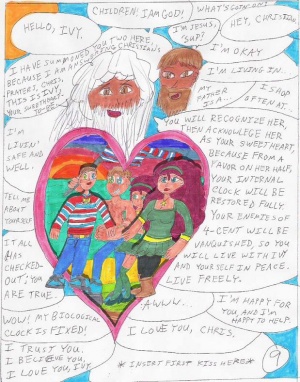
Like many children, Chris is unconcerned with making his work clear and easily read. Chris does not plan page layouts in advance, and instead draws panels one at a time, cramming however many he can onto the page and further harming his comic's visual clarity. He does not understand (or perhaps care) that word balloons and text boxes must be arranged left to right and top to bottom in the intended order in each panel, and that the panel's art must be set to accommodate that order. The dialogue flow in panels with multiple word balloons in Sonichu regularly must be pieced together from context clues by the reader. The worst example of this is seen below: Chris establishing a reading order by numbering lines of dialogue.
Chris as a poet and lyricist
- See also: Chris and music
| “ | I’d lay her down caress her gently tickle her fancy; have her tickle my fancy, and give it to her with the learned lonely experience I’ve endured. | ” |
| Chris, expertly stirring feelings of both mild disgust and confusion[7] | ||
In poem and lyric, Chris has a poor understanding of the anatomy of an appealing composition. He mistakes exceedingly saccharine language for the romantic. He also pads out gaps with random-access humor and curiously dated language.
He has total disregard for proper meter, and rhymes are forced with bizarre neologisms (Rosey, as often as birds tweet/will you be my lovely heartsweet?[8]). Sometimes he can't even manage to make it rhyme (Heart-broken, sad and very lonely,/I may never remove my virginity[9]). The result is poetry that occupies the uncanny valley between metric and free-verse form.
Not even the Bard of Avon is safe from Chris. In Sub-Episode 3, a famous line from Macbeth has a stupid couplet of Chris's making tacked on to its end (I shatter hearts as I please! I hurt them hard with the greatest of ease![10]), while Bubbles mutilates a line from the The Tempest in Sonichu 8.[11] Needless to say, the contrast is not that hard to see.
Chris as a journalist
Nintendo Power Magazine was a publication released by Nintendo about Nintendo products. It sought to inform video game enthusiasts anything they might want to know about Nintendo products, and how they should feel about them. It is easily Chris's single greatest journalistic influence. To this day, he seeks to plainly tell the masses what the truth is and how we should feel about it.
Chris's first notable work of journalism is his final project in high school, A Week With Christian Chandler. It is a prime example of Chris's understanding of honesty: the only thing that could reflect poorly on him in his mind was the omission of any fact; Chris saw fit to document anything and everything that happened, including sleeping through class. At this early stage it seems that Chris was unwilling to massage the truth because he had yet to experience the disapproval of peers that concerned him, as the reactions of Internet trolls would later.
Chris's next journalistic effort came in college with Sonichu's News Dash!, which operated under the characteristic presumption that the details of his daily life were of inherent reader interest. Funnily enough, his style is reminiscent of Yellow journalism, being characterized by:
- Little regard for conventional journalistic ethics or consistency.
- Scare headlines in huge print, often of minor news.
- Lavish use of pictures, or imaginary drawings.
- Use of faked interviews, misleading headlines, pseudoscience, and a parade of false learning from so-called experts.
- Emphasis on full-color Sunday supplements, usually with comic strips.
- Conflicts of interest: Topics that affect the author directly, a big no-no in journalism (except in opinion pieces).
- Dramatic sympathy with the "underdog" against the system.
Chris being Chris also incorporates elements from Tabloid journalism, such as:
- Sensational crime stories
- Gossip columns about celebrities and sport stars
- Junk food news
After watching Sachumo's Documentary about him, Chris gave his own ideas about the production of a similar piece. To the surprise of no one he wanted to focus more on the positives, like the people whose lives have been made better by interacting with him.
Chris as a blogger
| “ | (Okay, so it looks like @instagram also has a character limit per post; I can still work with that.) | ” |
| Chris in the middle of writing a wall of text.[12] | ||
Chris's blogging is a continuation of his News Dash! mentioned above. In a way, Chris's first and most frequently updated blog was his web page, in which he posted "updates" about his goings-on (such as they were; most updates were simply denouncements of a certain Dean). The site, however, was not in what most people would consider a blog format; instead of archiving and replacing old content with newer material, Chris simply stuck new updates wherever he could find new space that day, resulting in an erratic and bizarre page layout. He also experimented with conventional blog formats, and the results were only marginally easier to read.
To this date Chris has had several actual blogs:
The location may change, but the style is consistent and unmistakable. This may be linked to Chris not knowing exactly the purpose of a blog. Ideally, on a blog, one publishes one's opinions and experiences in a group setting, allowing constant meaningful communication. While Chris has no problems sharing intimate details about his life, he doesn't seem to get the communicative part. Blogs are just another place for him to spew truth and honesty, as well as to try to incite action against his detractors.
Another arguably more important fault with Chris's blogging is that Chris's blogs are fucking boring. Successful bloggers post about their life in much the same way as anybody else, but they know that they need to keep it entertaining to read. While Chris did unintentionally cause the occasional laugh, most entries are outright annoying.
Arguably the most notable blog ever made by Chris was the infamous Adam Stackhouse blog. Seething with anger, Chris showed that — just like with Wikipedia — he doesn't want to contribute, but enforce his beliefs on anyone who will listen.
| “ | In any case, I LOATHE Adam and his Sister for STEALING my one chance at taking my Sweet Gal-Friend to Seattle; it would have been terriffic. I might have even been able to change her outlook on not planning on having children (she and I are both virgins; although I am a FRUSTRATED, High-Functionally AUTISTIC, 25-YEAR OLD VIRGIN. And I LOATHE Surybuchwald and Aprelewsky as well, because their MUSIC probably landed those JERKS in 2nd and 3rd. | ” |
| Chris, demonstrating his able skills as net citizen | ||
Chris as an essayist
- Main article: Manchester High Leaks
While in high school, Chris was persuaded to stop napping long enough to write several graded essays. The lessons he failed to learn from these experiences continue to influence his prose style. Chris's education in essay-writing seems to have been limited to the basic five-paragraph essay. Chris was trained to think of the intro paragraph as the "appetizer"; the body paragraphs, respectively, as "veggie", "potatoes/rice/pasta" and "meat"; and the conclusion as "dessert" (anything related to food seems to reach Chris). Despite having such a sophisticated structural apparatus at his disposal, Chris's essays were shallow and incoherent (in part this was a product of the assignment restrictions – his essay "Work vs. Student Life", for example, was only 100 words long). His history essay "Japan, 1912-1949", which appears to be his first foray into the genre, lacks a clear thesis sentence, well-organized body paragraphs, or a meaningful conclusion (not to mention using WWI sources in points about WWII). His teacher understandably deemed it "very confusing & unclear". Another history essay, "Who was our best President?", does a better job of segregating main ideas within the three body paragraphs, but remains extremely rigid and rote. His "Canterbury Tales" essay has no real structure at all and simply retells one of Chaucer's morality tales in a rambling narrative. For this assignment, he received only two out of ten points for "Clarity of Expression."
These limitations and oversights have carried over into what nonfiction writing Chris has done as an adult. Nearly all of his nonfiction prose has been autobiographical (and what fiction he writes generally involves suspiciously familiar material). The only real exception has been "Chris Chan's Heroic Dream for Our Community NOW and in the Future",[13] his clarion call for Dating Education, which he submitted to a contest in 2009. Here there is nothing to suggest that Chris ever learned even the basics of essay writing, with its buried thesis, its unsupported paragraphs, its idiosyncratic capitalization, and a fucking frowny face. Chris's essays about his favorite subject – himself – similarly show little regard for writing standards. "Story of My Current Days" has a thesis of sorts, but the body is simply a clumsily-structured retelling of events which Chris expects the reader to glean meaning from without any assistance from him. His much expanded Wikipedia profile has a self-serving thesis and is helpfully carved into subheadings, but remains fluid and disjointed. The several essays he wrote for the CWCipedia share the same first-draft problems of sentence-long paragraphs and an unappealing potpourri of boldface, italics, and capitalization.
Chris's reading habits
Anyone who wants to be a good writer must be well-read. It's one of the most natural ways to become acquainted with good style, the elements of a plot, and correct spelling. Chris's ego is so inflated that he thinks he can produce something brilliant with no effort whatsoever. The only books Chris has ever been seen reading voluntarily are paperback Goosebumps and Fear Street novels by R.L. Stine which are notable only for their sheer mediocrity. Chris read these books, which were written for elementary schoolers, well into high school. In terms of the readings he was assigned at Manchester High School, Chris retained only a superficial understanding of them. During the Father Call, Chris said that he read To Kill a Mockingbird a mere month prior, which in all likelihood he only mentioned because it was assigned in high school. This was almost instantly proven false when he confused it with Of Mice and Men, another high school assignment. The high school essay he wrote about a selection from Geoffrey Chaucer's Canterbury Tales earned only a 69%.
See also
Sources
- ↑ The Strangest Fandom on the Internet, 28 June 2019
- ↑ Issue 0 Page 44
- ↑ Mailbag 19
- ↑ July 2019 social media posts
- ↑ Issue 9 Page 52
- ↑ Mailbag 19#Textwalling
- ↑ For My True Love, I Would…
- ↑ Sonichu's Ode to Rosechu
- ↑ Saddest Heart in the World
- ↑ Issue 4 Page 20
- ↑ Issue 8 Page 95 (paraphrasing Miranda's famous line, "O brave new world, That has such people in't!")
- ↑ March 2021 social media posts#CWCisms and Tetris
- ↑ CWCipedia article|CWCipedia
| Chris and... |
|
Body: Drugs • Fashion • Gender • Health • Nutrition • Sex Psyche: Coping • Manipulation • Mental healthcare • Nostalgia • Reality Personality: Anger • Ego • Hypocrisy • Kindness • Negligence • Personality • Remorse • Stress Expression: Art • Censorship • English • Language • Music • Oratory • Spanish • Writing Society: Contests • Death • The Law • Politics • Pornography • Race • Reading • Religion • Sexuality • Socialization • Sports Business: Brand loyalty • Business • Copyright • Money • Negotiation • Work Technology: Cameras • Electronics • The Internet • Science • Television • Video Games |
